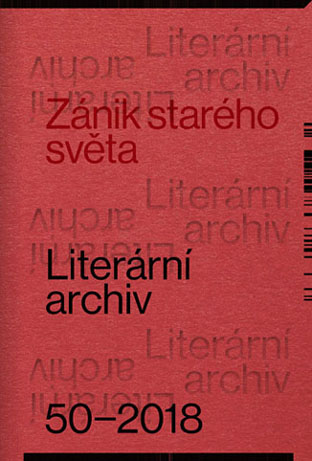Karel Horký – voják druhé armády
Karel Horký – the Soldier in the Second Army
Author(s): Štěpán FilípekSubject(s): Czech Literature, Pre-WW I & WW I (1900 -1919)
Published by: Památník národního písemnictví
Keywords: Karel Horký;journalism;feuilleton;the First Wo;resistance;propaganda;Tomáš Garrigue Masaryk;Edvard Beneš;Josef Dürich;the Bohemian National Alliance (České národní sdružení);Poděbradka;
Summary/Abstract: His extraordinary journalistic skills predisposed Karel Horký to become a significant figure of resistance journalism and propaganda during the Great War. It was here that his journalistic style relishing in pamphletic belligerence, exquisite wording and effective slogans and catchwords proved useful. However, his individualism, explosive character and unwillingness to bow down to authorities were sooner or later bound to surface. This brought him into existentially strained, risky and even dangerous situations. The trigger was the fate of his father-in-law Josef Dürich and the fall of the ex-vice chairman of the Czechoslovak National Council (Československá národní rada). Horký stood to his defense (their family ties not being the only reason), but this got him into an insolvable situation: a short period of cooperation with Edvard Beneš was followed by a great rift between both men and Horký was as a result professionally as well as socially isolated, without, however, resigning on his efforts to work as a journalist in support of the establishment of an independent state. When the independence was gained, Horký did welcome it, but he was never persuaded to identify his citizen loyalty to the Republic with the loyalty to the Republic’s leading representatives. The events that had taken place during the war thus had a profound effect on Horký’s subsequent position within the public sphere. He gained a long-lasting reputation of always having to be in an opposition, even of a grumbler. In the interwar period he joined the right wing political camp. Despite that, it would be a pity to brush his journalistic work aside by reference to his ties with Dürich or by a one-sided interpretation of facts. Not only is his work original and unmistakable, but it also often offers an interesting perspective on historical events, coming from a direct witness and participant.
Journal: Literární archiv
- Issue Year: 2018
- Issue No: 50
- Page Range: 6-33
- Page Count: 28
- Language: Czech

